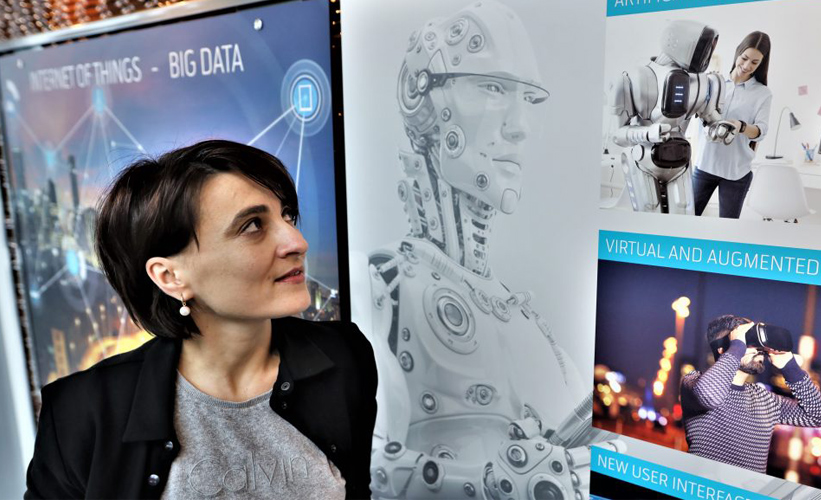Can Asia get ahead of the AI race? We asked an expert who advises the EU and heads AI research at Telenor
Can Asia get ahead of the AI race? We asked an expert who advises the EU and heads AI research at Telenor

Where is artificial intelligence (AI) headed in Asia? We spoke to Ieva Martinkenaite to find out. She is Head of Telenor Research and Innovation, represented Telenor in the European Commission’s High-Level Expert Group on AI and was among key industry leaders in Norway establishing the Norwegian Open AI-lab. Her view on Asia is that the AI race is speeding up and has the potential to solve major challenges; but only if its benefits can be spread evenly and ethically.
“AI is a general-purpose technology that will impact every sector of society. And when I see the speed of development in Asia, and the skyrocketing amount of data being produced, that tells me we can expect AI to deeply impact the economies here,” Martinkenaite says.

She acknowledges that impact may be inducing anxiety in some areas, but she is also keen to highlight its benefits: “AI has the potential to combat climate change, prevent spread of diseases, and increase agricultural productivity. These issues are very real in Asia, and they impact large populations.”
“However, for AI’s benefits to be distributed evenly, we need to be cautious of the gaps that already exist. Some Asian countries, such as Japan, China, Singapore, and South Korea, are investing heavily in data and AI infrastructure including skills. But in South and Southeast Asia, many countries are still lagging in their digital adoption. This creates a risk for polarization in Asia,” she adds.
Nor will AI affect every industry at the same speed, Martinkenaite says. “Some areas will feel its impact much faster. For example, content production is likely to be disrupted by generative AI such as ChatGPT. It allows you to create new product descriptions or new ads with powerful video content. But AI will not be a silver bullet. Companies will need high data literacy, domain knowledge and specific skills, such as data and software engineering, to put AI-generated recommendations into their product pipelines.”
“When I see the speed of development in Asia, and the skyrocketing amount of data being produced, that tells me we can expect AI to deeply impact the economies here.”
Ieva Martinkenaite, Head of Telenor Research and Innovation, Telenor Group
Martinkenaite stresses the need to ensure that AI is used in a responsible way. “We must create trust in the development and use of technology for our customers to adopt AI products and services that can, among other things, minimise cyberattacks and ensure uninterrupted connectivity. It’s therefore imperative for telcos to continuously invest in data, cloud and AI journeys,” she says. “For customers, it means better customer service, personalized offers, and secure, resilient and high-quality mobile connectivity.”
To get ahead of these changes, Martinkenaite recommends countries invest in data literacy and software competencies. But they must do so with an eye to regulation that should ensure the development and deployment of AI technology in a responsible way to mitigate risks. “In the European Union, they are going full speed ahead with AI regulation, which will be like a new General Data Protection Regulation (GDPR). When it comes to Asia, Singapore, for example, is watching very closely the EU regulation to ensure responsible AI development. What’s really needed is frameworks for trusted AI that are global, transparent, and which respect fundamental human rights,” Martinkenaite says.

Martinkenaite lists three categories of risk associated with the development, deployment and use of AI. First, by using AI we should not discriminate people (e.g., give better offers or job promotions) against their gender, sexual orientation, ethnicity, or religion. Secondly, the inner workings of AI systems should be explainable. If a bank’s AI declines one’s loan application, for example, we should be able to understand what motivated that decision. Thirdly, we should ensure that humans are involved at every step of AI’s creation and use, particularly in cases of high-risk AI (e.g., when use of this technology can have impact to human health)
To address these challenges, Singapore’s Ministry of Communications and Information recently announced the launch of the AI Verify Foundation, which brings together public and private actors. This is also the model recommended by Martinkenaite.
“We established the Norwegian Open AI-Lab with partners, and it’s started scaling. I would recommend public-private partnerships,” she says. “Telenor has more than 50 years of experience working with academia through its dedicated research and innovation unit. The Open AI-Lab has been conducting fundamental and applied AI and ML [machine learning] research in sectors such as telecoms, maritime, energy and transport for more than five years—and it continues to attract investment and talents. I believe in these partnerships. It’s the way to go for Asia to leverage the scale that exists in the region.”


